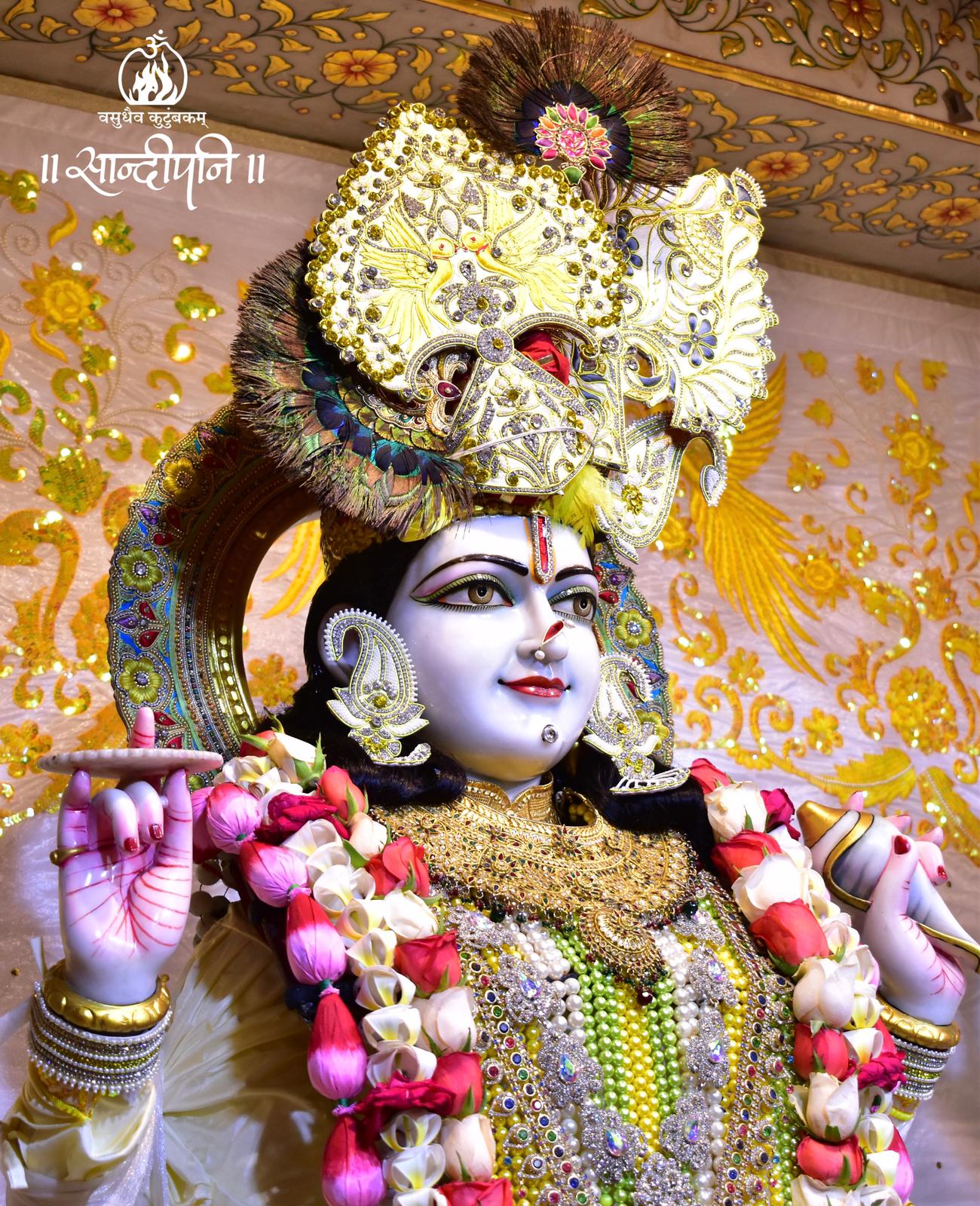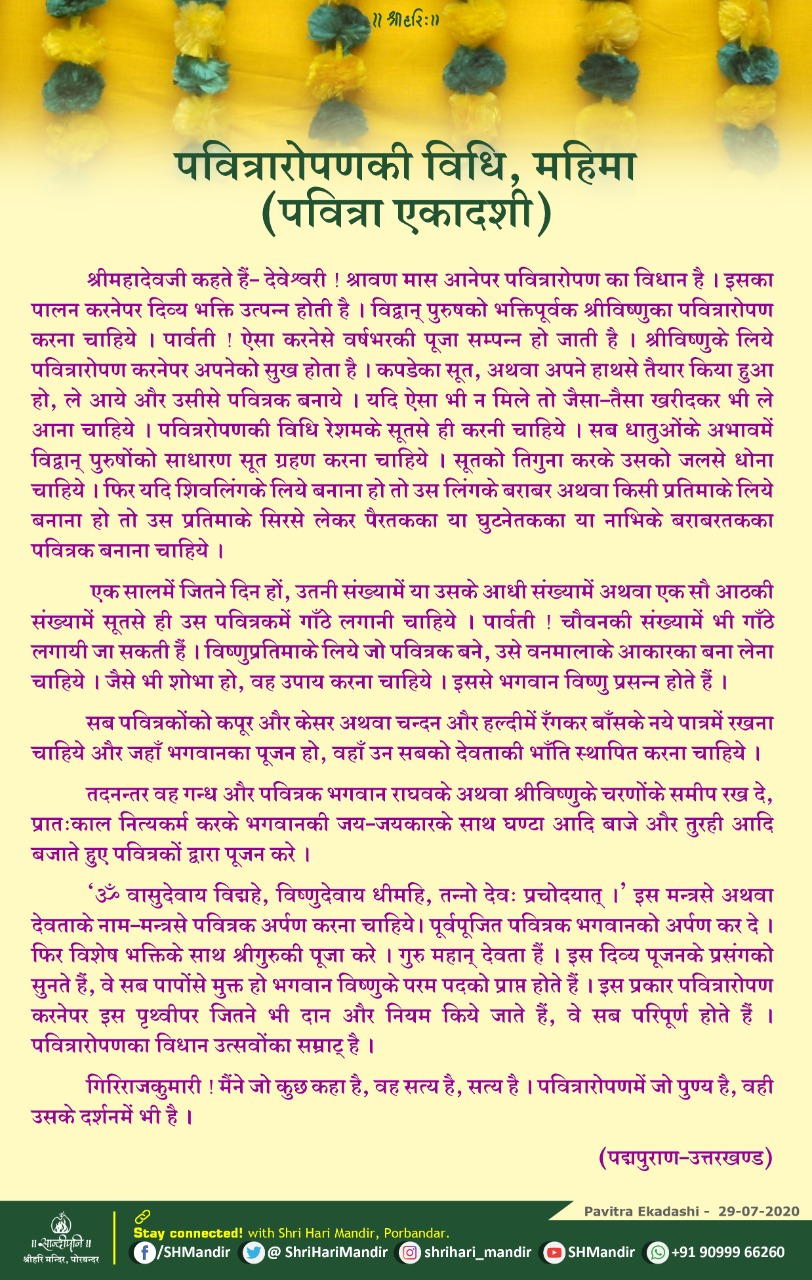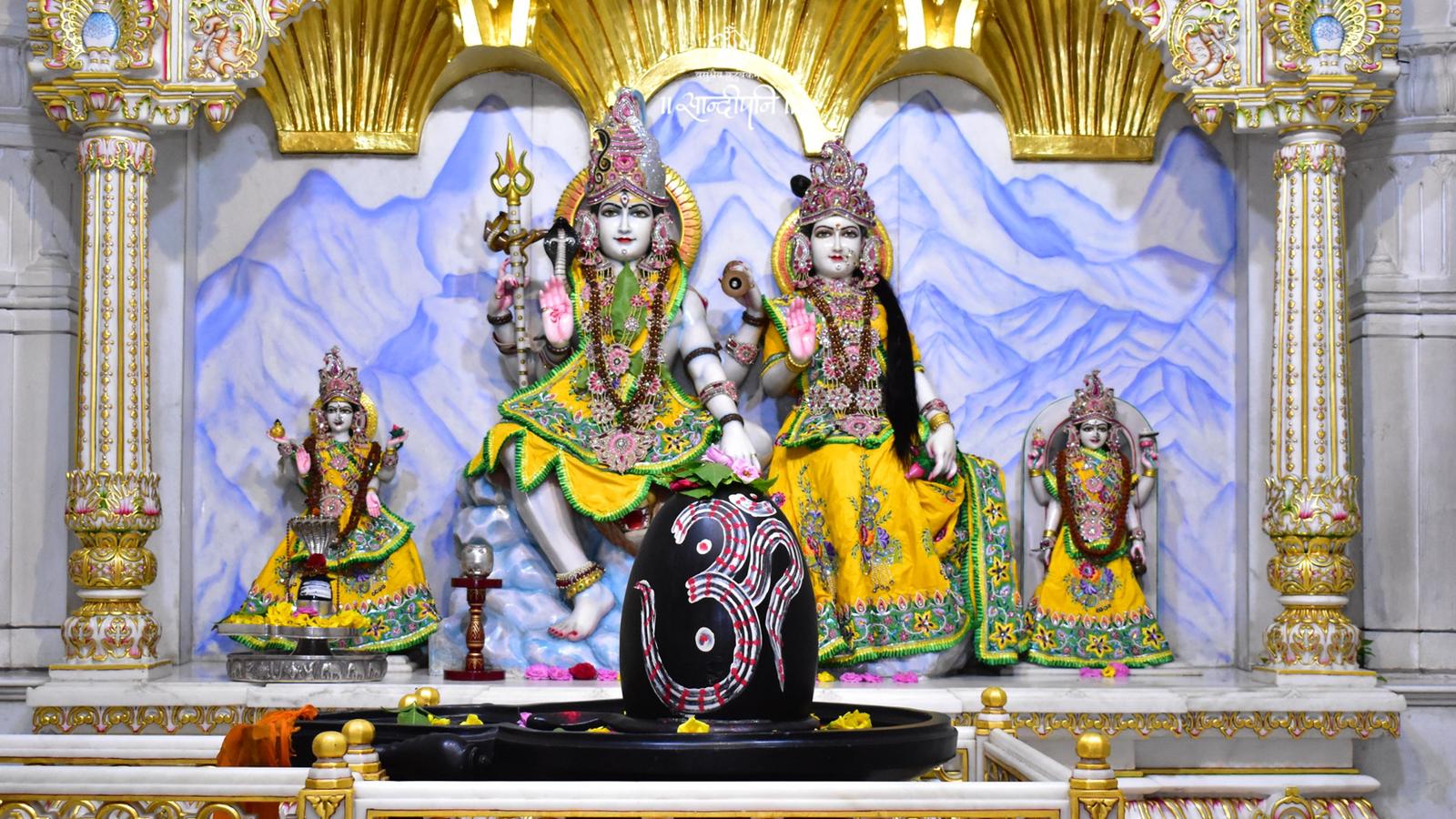Putrada Ekadashi Vrat Katha
– 🌳 A fast that ensures the continuation of the family tree (lineage)!
⚪ ShriHari Mandir (Porbandar) is celebrating Putradā Ekādaśī fast on Wednesday, 18th August, 2021.
⚪ This fast is observed on the eleventh day of the first fortnight (Śukla pakṣa) in the month of ‘Śrāvaṇa.
⚪ The unique significance of each Ekādaśī Kathā is explained to Dharmarāja Śrī Yudhiṣṭhira Māharāja by Śrī Krṣṇa, in the ‘Uttara Khaṇḍa’ of the Padma Purāṇa.
⚪ Śrī Krṣṇa explains the significance of this Ekādaśī fast through a story from the beginning of Dvāpara Yuga.

⚪ What is the story of Putradā Ekādaśī?
✸ In the Ancient Kingdom of Māhiṣmatī, resided a devout and principled King named Mahījita; who used to serve his people considering them to be the form of his own progeny.
✸ Time passed by, but King Mahījita was unable to produce an heir to his throne, for which he felt very sorry. He continued to serve the people despite not having sired his own son.
✸ As the King grew older, the people of the kingdom also began to worry as to why such a devout King was not able to receive the blessing of a child (*to continue his lineage and discharge his debts to the ancestors).
✸ One day King Mahījita invited the public and priests of his kingdom, and addressed them thus- ‘Dear fellow citizens, (to the best of my knowledge) I have not committed any sins in this lifetime, nor have I stored unrighteously earned wealth. I have always shown my respects to the Brāhmaṇas and deities. I have taken care of this kingdom and you all, as I would, of my own son. And, even if I may have friends, I have been sure to punish them equitably should they have committed any injustice. Thus, I am unable to understand which sinful deed of mine must be the root reason for my inability to have a son. Please deliberate upon this and advise me accordingly.’
✸ The King’s humble words gave rise to a swell of compassion in the hearts of the kingdom’s people and priests. Taking learned scholars (Brāhmaṇas) along with them, the King and kingdom’s well-wishers all entered into the forest with the firm goal of finding any solution or direction for their beloved King to be blessed with a son (for his reign to continue in the form of his lineage).
✸ Knowing the supreme importance of a saintly personality to accomplish all life aims, they keenly searched for any hermitage blessed with the presence of Rṣīs. They were blessed with the divine sight of a Rṣī who was as majestic as the Sun, and whose aura was continuously growing in splendour. They paid him their sincere obeisances an offered honour.
✸ He was none other than Lomaśa Muni— well-versed in matters of Dharma; a scholar of Sanātana Vedic scriptures; and an enlightened soul with a long-life. It is said that his name indicates the quality of his divine body being filled with pores (of hair), and he is as powerful as Lord Brahmā. At the end of every Kalpa, one body hair strand falls from Lomaśa Muni’s body.
✸ Lomaśa Muni asked everyone the reason for their being here. The people and priests greeted him and explained their distress, declaring, ‘We are willing to perform unwavering asceticism to ensure our King is blessed with a son.’ They asked the Sage to instruct them of a solution for their King.
✸ Lomaśa Muni entered into a deep meditation spanning 48 minutes (two ghadis), after hearing their noble intentions. He then explained that whilst the King had not committed any sinful deeds in his present lifetime, he had done so in his previous lifetime, where he was a wealthy merchant (vaiśyā).
The Story of King Mahījita’s Previous Life’s Sinful Deed
➢ One day (on the tenth day of the first fortnight (Śukla pakṣa) of the month of Jyeṣṭha), whilst the merchant was walking through various towns and carrying out his business, he was overcome by thirst under the fierce Sun’s heat.
➢ He started looking for water, and soon, found a reservoir of water by the town’s border. He decided to go and quench his thirst there; but at the same time, saw a cow and her calf reach there.
➢ The cow, too, was suffering from the heat; and as soon as she and her calf started drinking from the reservoir, the merchant mercilessly pushed them aside, and started drinking the water himself.
➢ ‘It was due to this sinful deed that the King is without a son today. Whilst the King definitely received the enjoyment of a Kingdom due to some lifetime’s meritorious deed, but due to this alleged sin, he was unable to receive a son,’ explained the Sage.
✸ The people folded their hands in front of the Sage, and asked him to instruct them of what meritorious deed they could perform to cleanse themselves of previously performed sinful deeds. The meritorious deed being referred to here is known as, ‘Prāyaścitta Karma’.
✸ Lomaśa Muni advised them observe this Putradā Ekādaśī, which bestows one with whatever fruit one desires.
✸ The people, priests and Brāhmaṇas bowed down to the Sage and observed this Putradā Ekādaśī fast with all the necessary rituals as learned from the Sage.
✸ They all dedicated the fruit of their fast to their King, and in the form of their collective fruit, the Queen conceived and gave birth to a radiant prince.

⚪ This Ekādaśī is also known as ‘Pavitrā Ekādaśī’, because it is said that offering colourful garlands made of cotton wool and thread (known as, ‘Pavitrā’ Garlands) to Lord Viṣṇu and Lord Śiva (Hari-Hara) on this day, is meritorious.



⚪ One who listens to the significance of this Ekādaśī Kathā is rid of all their sins. Not only does one gain joy in this world, but one also ascends to Heaven.
🌐 Stay tuned to know more about the respective significance of, rituals involved in, and fruits reaped from, each Ekādaśī Kathā!
🔆 #DidYouKnow—Lomaśa Muni‘s name consists of two parts in Saṃskṛta;
1) ’Loma’ indicates the pores of hair upon our body;
2) and ’śa’ indicates destruction.
Thus, ‘Lomaśa’ refers to the one whose body hair falls.
🔆 #DidYouKnow—“Sound, Touch, Form, Taste and Smell are the food of the senses. Through self-restraint one must prevent the senses from indulging in material food (viśaya) today. This is what it means to fast (keep the senses without their food). To connect all senses with God is the Ekādaśi vrat,” tweets @PPBhaishri.
🌙 #FunFact—There are two Ekādaśīs in every month; falling on the eleventh day of every lunar fortnight. The Ekādaśī falling in the bright half of the lunar month (leading up to Pūrṇimā—Full Moon) is known as ’Śukla pakṣa’ Ekādaśī; and the one falling in the dark half of the lunar month (leading up to Amāvāśya—New Moon) is is known as ‘Krṣṇa pakṣa’ Ekādaśī.
#PuraanPrasaad by Rishi Dhavalbhai Joshi
#putradaekadashi
#pavitraekadashi
#ekadashi
#vrat
#fast
#fasting
#Krishna
#Yudhishthira
#SageLomash
#Shraavan
#Chaturmaas
#puraan
#padmapuraan
#sandipanividyaniketan
#shriharimandir